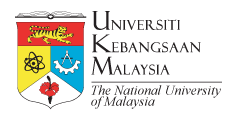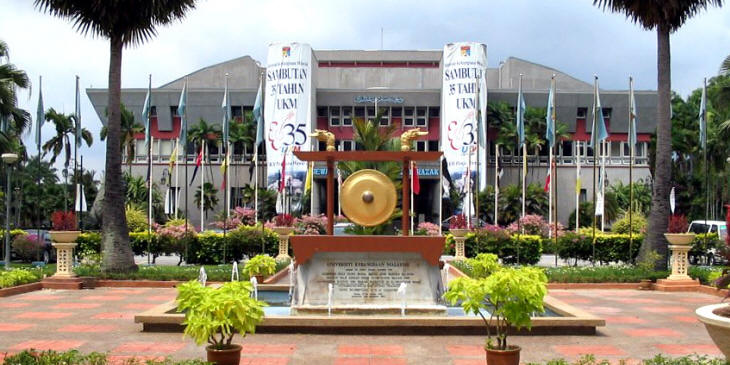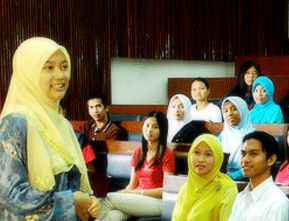

Universiti Kebangsaan Malaysia (UKM), was established on 18 May 1970 as the national university with the mission of promoting Bahasa Melayu (Malay language) as the language of knowledge at the pinnacle of the national education system. With an excellent track record in research, academic programmes, community engagement and internationalisation, UKM has evolved into one of the leading universities in the region. It is well supported by modern infrastructure in a sustainable green campus.
UKM was appointed as one of the four research universities of Malaysia in 2006 based on it's excellent record in research for 40 years.
The availability of the North-South Highway network, KTM Komuter services, and local buses has made the journey to the campus for students trouble-free and accessible, and also to the visitors who wish to have a visit to the University. Kuala Lumpur International Airport (KLIA) in Sepang also makes the University even closer to the international reach. UKM main campus in Bangi is located in the MSC vicinity and very near to Putrajaya and Cyberjaya, the two constituencies that are considered to be the catalyst for the development of information technology.
The university’s main campus in Bangi, Selangor Darul Ehsan spans an area of 1,096.29 hectares approximately 35 kilometres from Kuala Lumpur. The campus is situated in a valley surrounded by hills and greenery, providing a serene and conducive environment for learning and knowledge exploration. The faculties and institutes housed in the main campus are the Faculty of Economics and Business, Faculty of Engineering and Built Environment, Faculty of Islamic Studies, Faculty of Science and Technology, Faculty of Social Sciences and Humanities, Faculty of Law, Faculty of Education, Faculty of Technology and Information Sciences, Graduate School of Business (GSB-UKM), Institute of Malay World and Civilisation (ATMA), Institute of Environment and Development (LESTARI), Institute of Malaysian a International Studies (IKMAS), Institute of Occidental Studies (IKON), Institute of Space Science (ANGKASA), Institute of Microengineering and Nanoelectronics (IMEN), Institute of Systems Biology (INBIOSIS), Institute of Solar Research (SERI), Fuel Cell Institute (SEL FUEL), Institute of Islamic Hadhari (HADHARI), Institute of West Asian Studies (IKRAB), Institute of Ethnic Studies (KITA), Institute of South East Asian Disaster Prevention Research UKM (SEADPRI-UKM),Centre of Graduate Management, Centre of General Studies, Students Development Centre and other centres of service. Research UKM (SEADPRI-UKM), Centre of Graduate Management, Centre of General Studies, Students Development Centre and other centres of service.
42 years since it’s inception, UKM has produced 146,362 graduates. The university has since attracted global attention,as seen in the 2,937 students from 42 nations.
UKM was appointed as one of the four research universities of Malaysia in 2006 based on it’s excellent record in research for 40 years. That recognition has gained further ground when the Malaysia Genome Institute (MGI) and the International Institute of Global Health, United Nations University were set up at the university. Its areas of research were further consolidated and enhanced with the identification of eight niche areas; Challenges to Nation Building, Sustainable Territorial Development, Renewable Energy, Health and Medical Technology, Climate Change, Nanotechnology and Advanced Materials, Biological Diversity in Biotechnology Development and ICT: Content Informatics.

UKM is also the recipient of the Prime Minister’s Quality Award 2006, a recognition of its excellent achievements in the academic and management fields. It has also been conferred the status of an Autonomous University in January 2012, while it looks ahead to a Transformation Pelan by 2018 With these strong foundations, UKM aims at not just sustaining but also enhancing its level of excellence via its 2000-2020 (PS2020) Strategic Plan in line with its slogan, ‘Inspiring Hopes, Nurturing The Future’. All these developments has brought about greater confidence among its staff to continue upgrading their capabilities while enhancing their talents in a conducive, healthy and supportive environment as provided by the university.